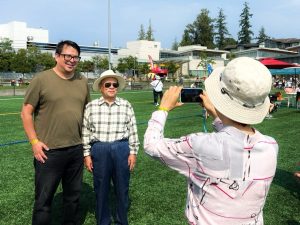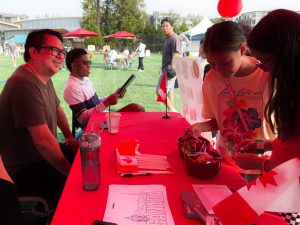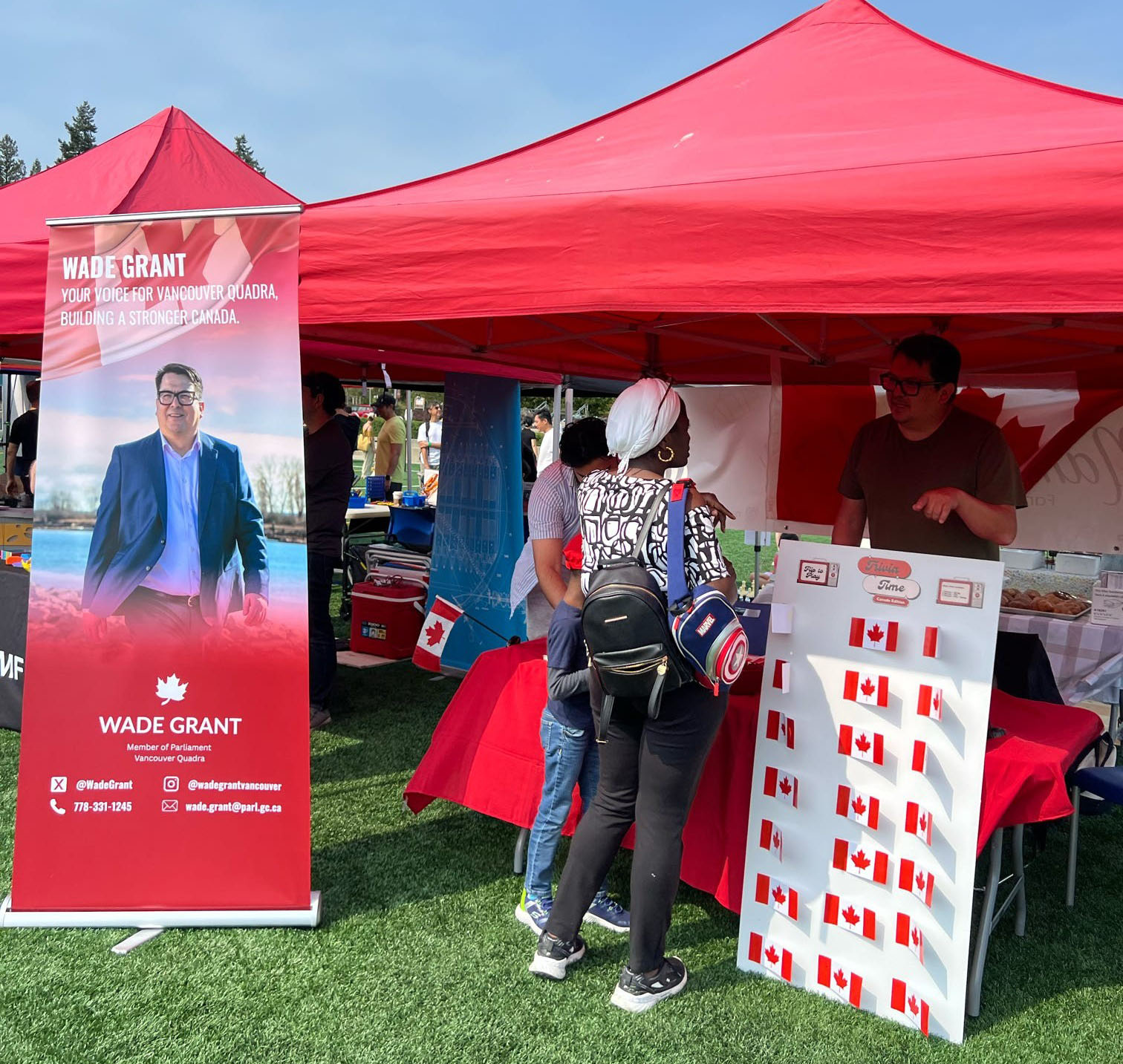It’s been five months since Wade Grant fulfilled a lifelong dream and was elected to Parliament.
Hailing from Musqueam First Nation, Grant won easily in April’s federal election, earning double the number of votes as his runner-up. He now has the job of representing the constituents of Vancouver Quadra, which includes UBC’s Point Grey campus, in Ottawa.
He’s the first from Musqueam to have been elected to serve in Parliament, and he’s been preparing for this opportunity since he was a child.
Grant – a UBC graduate and father of two – comes from a family dedicated to public service. Both his mother and grandfather were Musqueam chiefs, and following in their footsteps, he served as a Musqueam Band councillor from 2004 until 2014. In the decade prior to entering federal politics, he held a number of roles including special advisor on aboriginal issues to former B.C. Premier Christy Clark, and Chair of the First Nations Health Council.
He now represents just under 115,000 constituents as a Liberal Party MP, and he has also taken on the role of Parliamentary Secretary for the Ministry of Environment and Climate Change Canada.
The Campus Resident caught up with Grant during a phone call last month – a few weeks before he sat for his first session of parliament – to learn more about his background, his politics, and his goals for the people of Vancouver Quadra. Congratulations on your election victory.
While you were on the campaign trail, what were the hot-button issues that came up during your conversations with residents of Vancouver Quadra?
Housing affordability is one that’s always front and center, not only for people in this riding, but for students and young Canadians, especially if they’re going through their third, fourth, fifth year of university.
And for me, being from the local area – the mouth of the Fraser River – climate change and its impacts are always on the top of the mind of people in this riding.
I grew up in this riding, and it seemed like those that lived in and around this area had always had a very keen sense of what we need to do to combat that. My two children have a bit of climate anxiety themselves. And I’m lucky enough now to be the Parliamentary Secretary for the Ministry of Environment and Climate Change Canada, so I have a very close connection to what this government wants to do to ensure that we leave this earth in a better place than we inherited it.
UBC is changing with intense development. As a member of Musqueam First Nation and a former UBC student, how do you feel about Campus Vision 2050 and the way campus is growing and evolving?
Since I was a student back in the late 90s and the early 2000’s, I think the relationships the university has with those that live in the University Endowment Lands and those that live on Musqueam First Nation have come a long way. I think those relationships are very important to understand that, yes, campus does need to grow. It’s a large campus when you’re living there in the summer; there’s 15,000 people, but when (class) is in session, it grows to almost 80,000 people. So doing it in a thoughtful manner includes the voices of those living there at the moment and those that have called it home for thousands of years.
I know that Musqueam and the University of British Columbia are forging a relationship to ensure that we continue to do that, because anything that happens on campus impacts those that are living around campus as well. If you look at the traffic on Southwest Marine Drive in the morning going towards campus, it’s backto- back all the way to Granville.
So how do we alleviate that? Not building just for the sake of building but building for livability as well, to create a common community. And I think that the university has started to move forward in doing that. I know that there needs to be more conversations to do that, instead of having just a top-down approach. I think we need to have a holistic approach with different communities around campus.

Many campus residents recognize that we are on the unceded, ancestral lands of Musqueam, but many also say they are not fully aware of Musqueam perspectives towards development. Are Musqueam voices being heard?
I think so. I’m speaking just as a member of Musqueam, I’m not speaking as a member of Musqueam’s Council. Seeing my community present on campus, the pieces of art, the street signage, developing gathering spaces, I know that the University was talking with Musqueam.
These are things that wouldn’t have happened 30-40 years ago, but now are. It’s allowing Musqueam to have a presence there and becoming more and more seen.
Are we where we need to be? I don’t think so, but we are slowly getting there. I think there are still some people in Musqueam who think we can do much more, and that’s why we still have a relationship committee between Musqueam leadership and those that are planning for campus into the future.
What can be done to improve this relationship?
Having somebody from Musqueam in the governance structure there. There’s no spot for Musqueam on the (UBC) Board of Governors or the Senate. Musqueam is treated more like a stakeholder than title holders of the land. You know, just to share that constant idea and understanding from a Musqueam perspective.
Those are large things that can be done, and there are micro things that can be done, like recognizing UBC campus is on the unceded territory of Musqueam. When you come to the roundabouts at W16th, you could have signage that says ‘Welcome to UBC at Musqueam’, or something like that. Just so people know and it piques their interest to want to learn more.
One other thing, the Musqueam language has been a fully accredited course at the university for many years. It’s one of the very few indigenous languages that are offered by universities in the world. And that’s something that’s been a huge success for Musqueam. So having our language being taught and revitalized with the help of the University has been something that’s been a big part of reconciliation.
Is there any dialog now to get a Musqueam voice on a body like the UBC Board of Governors?
I think there are high level discussions between the Musqueam leadership and those at the university. I don’t know where it is, but I know that there are consistent meetings with those two groups, and I think that they are putting something together in the form of a relationship agreement that will further the relationship in the next 10, 20, 30 years.
Moving along, Point Grey and UBC are viewed as two of the priciest communities in Metro Vancouver, which would make them probably some of the most expensive in the country. What’s being done right now at the federal level to make housing more affordable for campus residents?
We’re looking to expand our ability to start building homes in this country. The Prime Minister indicated during the election that Canada wants to get back into the business of building homes for Canadians, by Canadians, and with Canadian resources.
Also, eliminating the GST on homes up to a million dollars is something that we’ve done as well. And then looking to partner with like-minded groups to ensure that the right type of housing is built in and around our community in West Point Grey and the University of British Columbia.
Those are the first few things, and we’ll have more announcements coming out in the fall once we get to the budget.
This summer, the UBC Alma Mater Society launched a petition to get some traction on the proposed SkyTrain extension to campus. That petition has now collected over 14,000 signatures. The federal government has already allocated funds towards planning, but has the time arrived to push this project forward by committing more funds to get shovels in the ground?
When I was with Musqueam, I was a big proponent of that, and I worked with the University of British Columbia. I think that it is a piece of infrastructure that makes sense to have the tens of thousands of people that commute to the university on a daily and weekly basis to be able to get there in a fast and fulsome way, rather than jumping off a SkyTrain at Arbutus and then jumping on a bus that will make its way here.
I think the discussions are ongoing, and I think governments are part of those discussions. I know there’s no financial commitment as of yet, but as the MP of Vancouver Quadra and as I’ve said in the past, it’s an important project for the university and for those that call this area home, so I’m a proponent and supporter of that.

The Trudeau government introduced a cap on new international student permits in 2024, and the policy has been extended by the Carney government. Do you agree with the cap?
I’ve been having discussions with my colleagues about that, how we move forward from where we are today. We want to have wholesome discussions with the Minister of Immigration. I want to have discussions with the University of British Columbia and other universities that fall within British Columbia and the Western caucus. I acknowledge that for universities, this is a financial burden and I want to find a solution.
How do you feel about the politicization of immigration, and would you push back against people who try to politicize immigration
Absolutely. I’m half Musqueam, but my grandfather is an immigrant from China, and my grandmother is from Europe. I’m a person who feels that this country is better because of immigrants that have come here. And I think that politicizing immigration is a slippery slope that we need to avoid. I absolutely think that immigrants have helped build this country, one of them being my grandfather, and I know many others have come here, and this country is as great as it is and continues to be because of immigration. And I think that we can find balance where everybody is treated fairly, so I don’t think that politicizing it is the way to go.
Apart from what we’ve already discussed, what are your major goals for your constituents and for Vancouver Quadra during your current term as MP?
Knowing that many people depend on our healthcare system in this country and this province, and being the former First Nations Health Council Chair, I’m looking at the ability to have a more holistic approach to healthcare and looking at the social determinants of health.
It’s a big, holistic thing that I’m trying to bring through my voice at caucus, that the healthcare system isn’t just about broken bones or contracting a cold. It’s about our surroundings.
I have a bit of expertise in that, having developed a 10-year strategy for First Nations in this province, but I also want to expand that to the voices of Quadra and those that are in my caucus as well. Healthcare is a big part of my life. I’ve had three open heart surgeries myself.
And how do you feel about the level of access to healthcare for constituents of Vancouver Quadra, and the availability of family doctors? Do you think that it’s adequate, or do you think more needs to be done?
It’s part of our plan and we said it during the election: we want to break down barriers for people to be able to come across provincial lines, and for those that have expertise from other parts of the world, to be able to come here without having to jump through so many hoops and practice something they’re experts in. We want to work on breaking down that red tape to ensure that we can have more people come and practice in places like British Columbia and Vancouver. And we do need to have more people that are qualified to be family doctors to provide care for our community members.
(This interview was edited for length and condensed.)
EMMANUEL SAMOGLOU IS THE MANAGING EDITOR OF THE CAMPUS RESIDENT.
